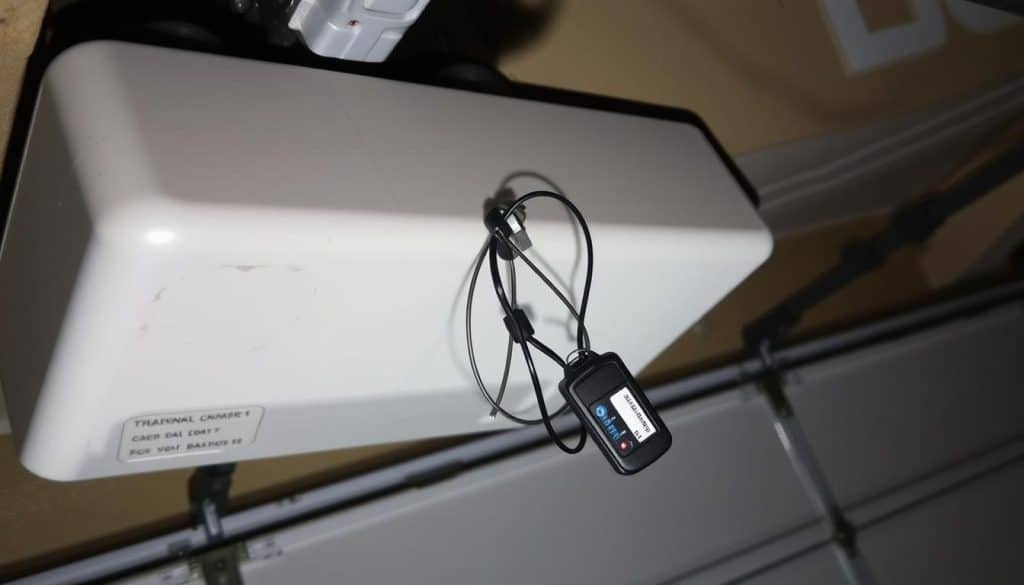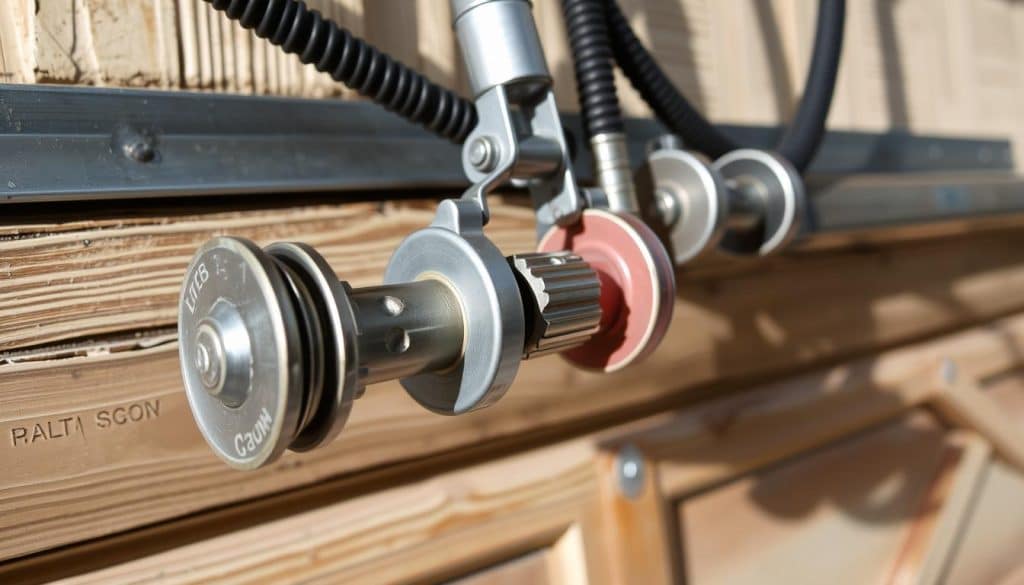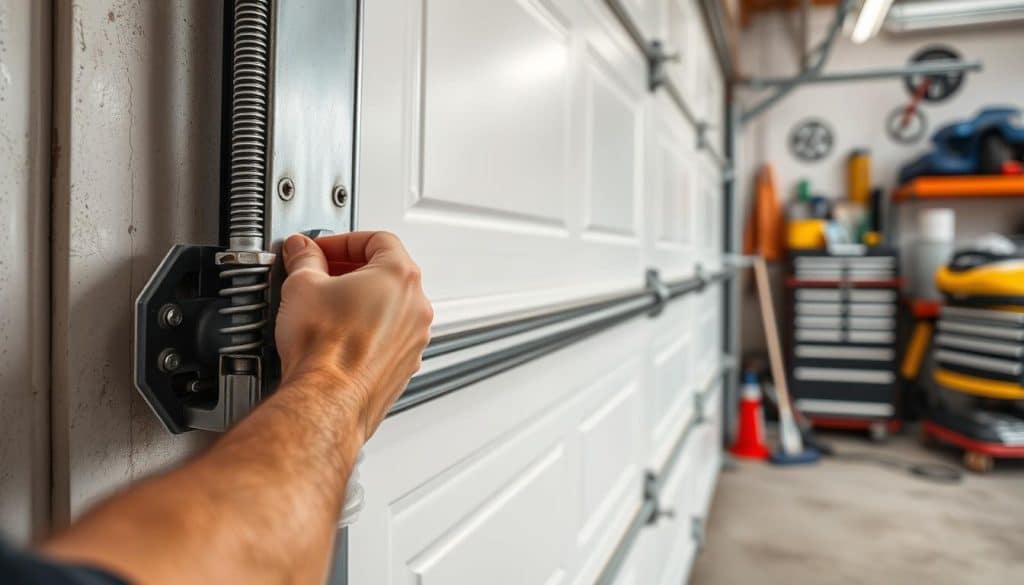Ever felt like your garage door has a mind of its own? What are The Most Common Garage Door Problems? It opens smoothly one minute, then won’t move the next. Knowing the common garage door problems can help us fix issues before they get worse. These problems, like noise and misalignment, cause frustration and can be unsafe.
As homeowners, knowing these issues helps us catch problems early. This way, we can fix them quickly. Garage door openers often wear out after 10 to 15 years. So, staying alert and informed is key to keeping our garage doors working well. What signs tell us it’s time to give our garage doors some attention?
Key Takeaways
- Common garage door problems include noisy operation, failure to open/close, and misalignment.
- Regular maintenance can prevent approximately 50% of garage door failures.
- Garage door openers begin to decline after 10 to 15 years.
- Misaligned sensors can account for up to 30% of garage door issues.
- Strange noises may indicate serious maintenance problems.
Understanding Garage Door Mechanisms
To fix problems, we need to know how garage doors work. These systems have many garage door components that work together. Each part is important for the door to move smoothly. Knowing how garage doors work helps us find and fix issues quickly.
How Garage Doors Function
Garage doors use many parts to work. The opener starts the door’s movement. Tracks guide the door as it moves. Rollers help the door slide smoothly, and springs lift it up.
Sensors keep everyone safe by stopping the door if something is in the way. Knowing about these garage door mechanisms helps us find where problems might be.
Essential Components of a Garage Door
It’s important to know the key garage door components. Springs often break, needing to be replaced in about 25% of cases. Rollers can wear out, causing noise and uneven movement.
Tracks that are not aligned can also cause problems. Safety sensors are very important, stopping the door if something gets in the way. Regular checks can make these parts last longer, cutting down on service calls by 30-50%.

Common Garage Door Problems We Encounter
We often see many issues with garage doors. Two big problems are a noisy door and one that won’t open or close. A noisy door usually means there’s something wrong that needs fixing.
Grinding or squeaking sounds can mean worn rollers, loose parts, or not enough oil. About 30% of garage doors make these noises, showing they might not be working right.
Noisy Operation
A noisy garage door is a warning sign. Regular checks can help, but many people forget to do this. If ignored, the noise can get worse and cause more damage.
Keeping the door parts well-lubricated and replacing old rollers can make it quieter and last longer.
Door Won’t Open or Close
Another common problem is when the garage door won’t move. This might be because the tracks are off, there’s something in the way, or safety sensors aren’t working. Around 15% of automatic doors get stuck, often because of track issues or broken parts.
Broken springs are a big part of these problems too. It’s important to fix these issues quickly for the door’s safety and to keep it working well.
Issues with Garage Door Openers
Garage door openers are key to our home’s function. Yet, they face many problems. About 30% of garage door issues are related to the opener. Knowing common problems helps us fix them quickly.
Malfunctioning Remotes
Remote malfunctions are a big headache. First, check the batteries. Most remote batteries last about two years. If you have many remotes, signal interference can happen.
Dropping your remote can damage it. This can cause programming errors. Keeping your remote clean helps it work better.
Safety Sensor Problems
Safety sensors are vital in garage door systems. But, they can have issues too. About 20% of garage door problems come from sensor problems.
Regular checks can prevent these issues. If sensors are off, the door might not close right. This is a safety risk. Keeping sensors clean is important.
Battery Issues
Battery problems are common with garage door openers. Dead batteries in remotes or controls can stop doors from working. Change batteries every two years to avoid trouble.
Checking both remote and opener batteries often keeps things running smoothly. This avoids delays and keeps your garage door working well.
Misalignment and Its Causes
Garage door misalignment can come from many issues. These problems can grow into big problems if not fixed. Knowing what causes misalignment helps keep our garage doors working right.
Reasons for Misalignment
Garage doors are heavy, making them prone to misalignment. House settling can happen unevenly, affecting the door’s performance. Accidents, like a car hitting the door, can also cause misalignment.
Bad weather, humidity, and frequent use without care can wear down parts. Worn rollers, broken springs, and loose tracks are common reasons for misalignment too.
Signs Your Door Is Misaligned
It’s important to spot misalignment signs early to avoid more damage. Look for uneven closing, strange noises, or a slanted door. A manual lift test can show balance issues if the door gets stuck.
Fixing misalignment quickly keeps the door working and safe. This helps avoid expensive repairs later on.

Springs and Their Importance
Garage door springs are essential for smooth door operation. They balance the door’s weight, making it easy to open and close. It’s important to know when springs need replacement to avoid safety risks and expensive repairs.
Signs of Worn-Out Springs
Spotting worn-out springs can prevent big garage door problems. Look out for loud noises like screeching or grinding. If the door feels too heavy, it might be a sign of worn springs.
Visible damage, like cracks or rust, also means it’s time to act. If the door moves jerkily or strains when opening or closing, check the springs.
How Springs Affect Your Garage Door
The springs we choose affect our garage door’s performance. Torsion springs are safer and more efficient, lasting about 15,000 cycles. Extension springs are cheaper but need more parts and upkeep to stay safe.
A well-maintained garage door opens and closes smoothly. If it only opens a bit or feels heavy, the springs might need checking. Regular checks and care can make springs last longer, keeping our garages safe and working well.
The Role of Cables in Garage Doors
Garage door cables are key to lifting and lowering the door smoothly. They can fray, snap, or come loose over time. Knowing about these issues helps us understand how garage doors work and stay safe.
Common Cable Issues
Homeowners often deal with broken garage door cables, like lifting cables. Breakage can happen due to rust, moisture, or constant use. Checking cables every two months helps spot damage or rust early.
Replacing worn-out cables quickly can avoid bigger problems and save money on repairs.
Importance of Cable Maintenance
Ignoring cable maintenance can be risky. A well-balanced garage door puts less strain on cables. Checking the door’s balance is simple: lift it halfway to see if it stays up.
Regular inspections and lubrication can make cables last longer. Also, getting a pro to check your garage door once a year is a good idea. This catches problems before they get worse. Using the right parts for replacements helps cables last longer and keeps your garage door safe.
Weather Stripping Problems
Weather stripping is key to keeping our homes cozy. It keeps out drafts, moisture, and pests. This helps save energy, which means lower bills for heating and cooling.
When weather stripping goes wrong, it hurts our home’s energy use. So, checking it often is a must.
Importance of Proper Weather Stripping
Garage doors can let a lot of energy escape. But, the right weather stripping can stop this. It makes a tight seal that keeps air out.
This saves money on heating and cooling. Plus, it keeps moisture, molds, and pests out. These are big problems for many homes.
Signs You Need New Weather Stripping
Knowing when to replace weather stripping is important. Look for cracks, tears, gaps, or stiffness. Feeling drafts or seeing water leaks are clear signs it’s time for a change.
Check your weather stripping at least once a year. This way, you can catch problems early and keep your home energy-efficient.
Garage Door Sensors
Garage door sensors are key to keeping our garage doors safe and working right. They are also known as photo eyes. These devices spot things in the way of the garage door. This stops the door from closing on people, pets, or things.
Knowing how these sensors work helps us fix problems and keep them in good shape. This is important for our garage doors.
How Sensors Work
Garage door sensors sit about 6 inches off the ground. They use light beams to work. If something blocks this light, the sensors make the garage door go back up.
Over time, laws like the Consumer Product Safety Improvement Act have made these safety features a must. They help keep our homes safe.
Troubleshooting Sensor Issues
Garage door sensors can have problems if they’re out of line or dirty. If something hits them, they might blink. Cleaning the lenses regularly helps avoid dirt problems.
If the sensors don’t light up, check for wire damage or power issues. Simple maintenance can fix about 70% of sensor problems. But, if it’s serious, getting a pro’s help is key for safety and door function.
Regular Maintenance: Why It Matters
Regular maintenance is key to keeping our garage doors working well and lasting longer. Garage doors open and close over 1,500 times each year. So, it’s important to have a maintenance plan.
We advise checking your garage door every three to six months. This helps catch small problems before they get big and expensive.
Schedule for Regular Maintenance
Every month, look for signs of wear like cracks or loose parts. Once a year, use silicone spray or lubricant on moving parts. Also, tighten bolts, brackets, and screws yearly for stability.
Many maintenance tasks can be done by yourself, like lubricating hinges. But, ignoring small issues can lead to big problems. Safety is a big concern, as 9% of burglars use the garage door to get in.
Benefits of Routine Checks
Regular checks are very important. They help spot wear in hardware, which is common in about 10% of checks. This proactive step improves performance and reduces noise.
It also lowers the risk of broken springs or cables. By following a maintenance schedule, we can avoid about 50% of common repair issues.
When to Call Emerald Garage Door Services
Knowing when to call Emerald Garage Door Services is key for your garage door’s safety and function. Many homeowners in Orlando face problems that affect their daily lives or security. Signs that you need professional help include loud noises, trouble opening or closing, and visible damage.
Signs It’s Time for Professional Help
Broken springs or misaligned tracks can cause bigger problems later. Faulty sensors are a safety hazard and need quick fixes. DIY repairs often don’t solve the issue, showing why expert help is needed.
Noisy doors might mean they need better parts for quiet, reliable use. Damage like dents or cracks affects security and function, making quick service essential.
What to Expect from Our Services
Our team is ready to tackle any garage door problem. We value honesty, quality, and clear communication. Our goal is to fix issues with durable parts that keep your door safe and working well.
We’re here 24/7 for emergencies and offer regular maintenance to prevent future problems. This includes lubricating and checking springs and cables, which can extend your garage door’s life and save you money.
DIY vs. Professional Garage Door Repair
Choosing between DIY garage door repair and hiring pros has its ups and downs. Homeowners think about cost, ease, and safety. Knowing these points helps us decide on garage door upkeep.
Pros and Cons of DIY Repairs
DIY can save money, like lubricating your garage door for $10 instead of $50. Fixing a garage door can save up to 85% of the cost. Yet, DIY can be tricky, leading to safety issues for 30% of DIYers.
While DIY is good for small fixes, big problems can cost more if not done right.
When to Leave Repairs to the Experts
For tough garage door issues, call the pros. About 70% of homeowners pick professional installation for its complexity. DIY fixes often need a pro’s touch, costing more.
Experts offer warranties and insured work, giving us peace of mind. They use special tools and know-how to fix problems fast. Knowing our limits helps keep our homes and us safe.

Conclusion: Keeping Your Garage Door in Top Condition
To keep our garage doors working well, we must check them often and do regular maintenance. Tips like cleaning tracks and rollers help avoid problems. This care can make springs last 7 to 15 years.
Don’t overlook the little things that keep our doors safe and working right. Testing sensors, updating remotes, and lubricating parts are key. Fixing small issues early can stop big problems later.
By making these habits part of our routine, we show we care about our garage doors. At Emerald Garage Door Services, we think knowing how to maintain your garage door makes it safer and more efficient for years.
FAQ
What are the most common garage door problems?
Common issues include noisy doors, doors that won’t open or close, and misalignment. Problems with the opener and worn-out springs are also common. Knowing these helps us fix problems quickly.
How can I troubleshoot noisy garage door operation?
Noisy doors often come from worn rollers or loose parts. Make sure to lubricate them regularly to quiet the noise.
What should I do if my garage door won’t open or close?
Check for blockages in the track, misaligned sensors, or broken springs. Fixing these issues quickly can prevent more damage.
How do I know if my garage door opener is malfunctioning?
Look for signs like remotes not working, doors moving strangely, or doors not staying closed. These problems often come from battery issues or sensor problems.
What are the signs of misalignment in my garage door?
Signs include doors closing unevenly, strange noises, or the door leaning. Fixing it quickly is important to avoid expensive repairs.
Why are garage door springs important?
Springs balance the door’s weight. Worn springs make it hard to open and close safely.
How can I maintain my garage door cables?
Check for fraying or detaching from the drum regularly. Keeping them in good shape is important for safety.
When should I replace my garage door weather stripping?
Replace it if it’s worn, cracked, or letting air in. Good weather stripping keeps your garage insulated and energy-efficient.
How do garage door sensors work?
Sensors detect obstacles to keep the door safe. Keep them clean and aligned for best performance.
Why is regular garage door maintenance important?
Regular checks prevent small problems from becoming big ones. A maintenance schedule can also make your garage door last longer.
When should I call Emerald Garage Door Services for help?
Call if you hear constant noises, see damage, or if the door is unsafe. They can fix it safely and effectively.
What are the benefits of DIY garage door repairs?
DIY can save money on simple fixes if you know what you’re doing. But, leave complex problems to the pros.
How can I determine if I need professional repair services?
If you face complex problems or safety concerns, call Emerald Garage Door Services. They have the skills to help.

